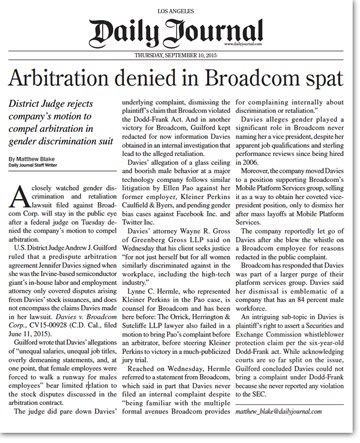Greenberg Gross Wins Ruling to Keep Gender Discrimination Lawsuit Against Broadcom in Open Court
 LA Daily Journal
LA Daily Journal
by Matthew Blake
September 10, 2015
A closely watched gender discrimination and retaliation lawsuit filed against Broadcom Corp. will stay in the public eye after a federal judge on Tuesday denied the company’s motion to compel arbitration.
U.S. District Judge Andrew J. Guilford ruled that a predispute arbitration agreement Jennifer Davies signed when she was the Irvine-based semiconductor giant’s in-house labor and employment attorney only covered disputes arising from Davies’ stock issuances, and does not encompass the claims Davies made in her lawsuit. Davies v. Broadcom Corp., CVlS-00928 (C.D. Cal., filed June 11, 2015).
Guilford wrote that Davies’ allegations of “unequal salaries, unequal job titles, overly demeaning statements, and, atone point, that female employees were forced to walk a runway for males employees” bear limited relation to the stock disputes discussed in the arbitration contract.
The judge did pare down Davies’ underlying complaint, dismissing the plaintiff’s claim that Broadcom violated the Dodd-Frank Act. And in another victory for Broadcom, Guilford kept redacted for now information Davies obtained in an internal investigation that lead to the alleged retaliation.
Davies’ allegation of a glass ceiling and boorish male behavior at a major technology company follows similar litigation by Ellen Pao against her former employer, Kleiner Perkins Caulfield & Byers, and pending gender bias cases against Facebook Inc. and Twitter Inc.
Davies’ attorney Wayne R. Gross of Greenberg Gross LLP said on Wednesday that his client seeks justice “for not just herself but for all women similarly discriminated against in the workplace, including the high-tech industry.”
Lynne C. Hermle, who represented Kleiner Perkins in the Pao case, is counsel for Broadcom and has been here before: The Orrick, Herrington & Sutcliffe LLP lawyer also failed in a motion to bring Pao’s complaint before an arbitrator, before steering Kleiner Perkins to victory in a much-publicized jury trial.
Reached on Wednesday, HermIe referred to a statement from Broadcom, which said in part that Davies never filed an internal complaint despite “being familiar with the multiple formal avenues Broadcom provides for complaining internally about discrimination or retaliation.”
Davies alleges gender played a significant role in Broadcom never naming her a vice president, despite her apparent job qualifications and sterling performance reviews since being hired in 2006.
Moreover, the company moved Davies to a position supporting Broadcom’s Mobile Platform Services group, selling it as a way to obtain her coveted vice president position, only to dismiss her after mass layoffs at Mobile Platform Services.
The company reportedly let go of Davies after she blew the whistle on a Broadcom employee for reasons redacted in the public complaint.
Broadcom has responded that Davies was part of a larger purge of their platform services group. Davies said her dismissal is emblematic of a company that has an 84 percent male workforce.
An intriguing sub-topic in Davies is plaintiff’s right to assert a Securities and Exchange Commission whistle blower protection claim per the six-year-old Dodd-Frank act. While acknowledging courts are so far split on the issue, Guilford concluded Davies could not bring a complaint under Dodd-Frank because she never reported any violation to the SEC.

RSS feed for comments on this post